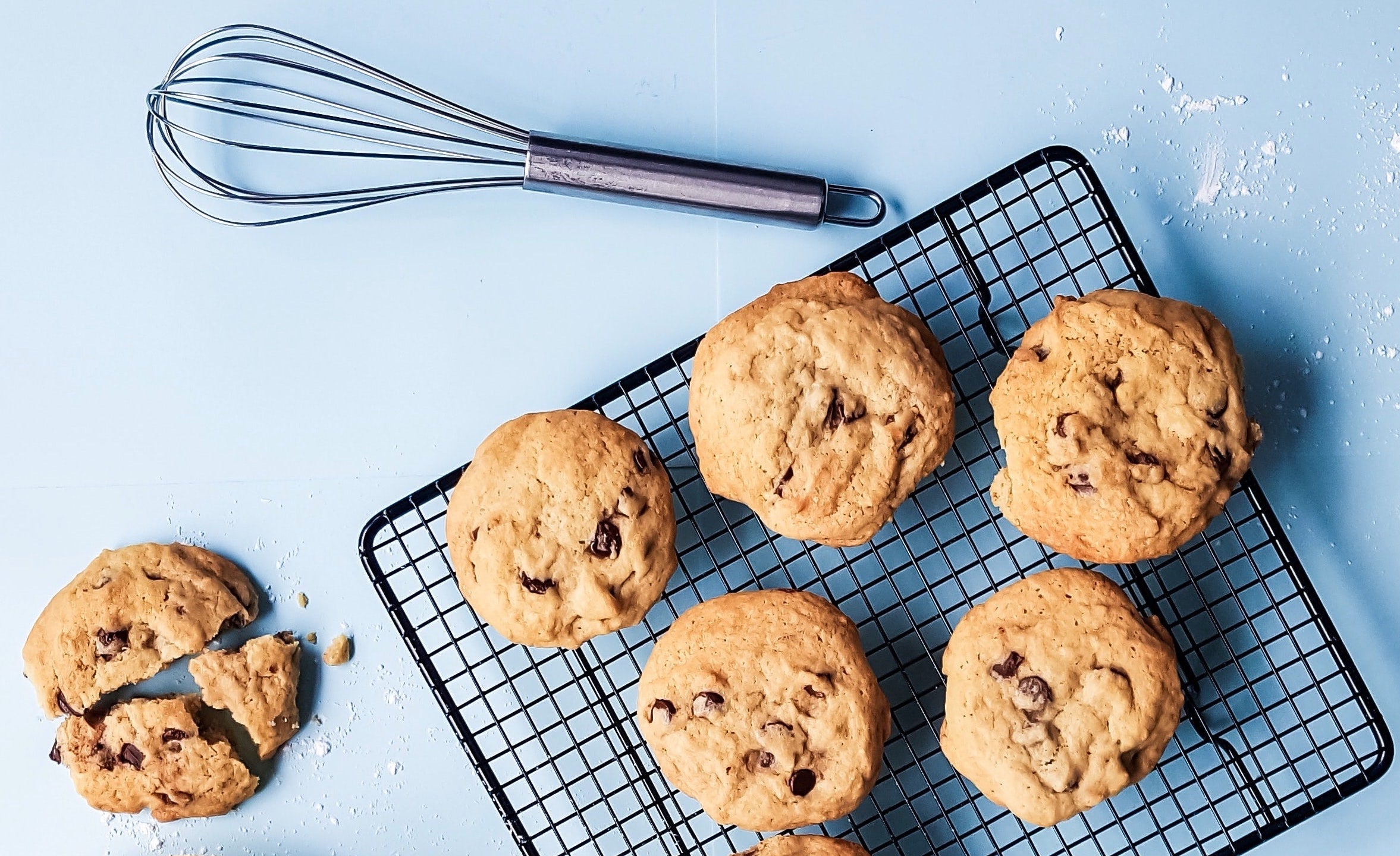The Vegan Baking Guide: Everything You Need to Know About Vegan Baking
Wondering what the best vegan substitutes are for common baking ingredients? Find all your answers and more in our ultimate guide for vegan baking made easy.


Whether you’re a longtime vegan, or just starting out, you may have resigned yourself to a life of skipping dessert… After all, avoiding animal products to make sweet treats like brownies, cakes, or cookies — without milk, butter or eggs — may sound impossible (if you want them to taste any good, that is). But, have no fear! We’re here to assure you dessert is everyone’s best friend — even vegans!
Aside from just giving your taste buds a treat though, veganizing your baking has some additional benefits. For one, it can make indulging healthier for you: for instance, an ingredient like flax seed, which can be used as an egg replacement, is a significant source of fiber — a health boost you likely wouldn’t get from a traditional version of that dessert. And, eating vegan, even if it’s not all the time, is better for the environment. Not only does limiting animal products reduce greenhouse gas emissions, it also saves water and wildlife habitats that are destroyed for livestock grazing.
So, are you ready to heat up your baking game? The key to successfully translate traditional desserts into vegan ones is pretty simple: if you understand the purpose an animal-based ingredient serves, all you need to do is find a corresponding vegan replacement that serves the same function. Consider — is this ingredient a binder? A sweetener? A moistener? Finding the right texture and taste replacement is crucial to make vegan desserts look and taste just right.
But a word of caution: while stove-top cooking allows the luxury of flexibility, baking is a much more precise science. Replacing or modifying ingredients, proportions, or cook times can alter the outcome in baking much more drastically than other forms of cooking. That means converting a non-vegan recipe into a vegan one may take some trial and error to find what works best with certain recipes.
If you’re just starting out with vegan baking, don’t reinvent the wheel — test out tried and true vegan recipes to get your feet wet first! These days, there are tons of great vegan baking recipes to follow. Once you get a feel for how certain ingredients interact with others, you can start to veganize your own favorite recipes.
To help you get acquainted with the basics, we’ve compiled the most common animal product baking ingredients, and their corresponding vegan replacements — plus, tips for when you may want to opt for one ingredient over another.
Eggs
Eggs are a staple ingredient in baking. They’re most often used as a binding agent to hold ingredients together, but also to help baked goods rise or to provide color and flavor. Eggs have a ton of potential replacement options, depending on what you’re baking.

- Flaxseed: Ground flaxseed is a great source of fiber, so you can feel good about adding some heart and gut healthiness to your desserts with this one. However, it does have a discernible nutty flavor, so you may want to use it in recipes where flavor neutrality isn’t a necessity. It can blend in well with muffins, breads, or brownies — but you can also use its flavor to your advantage with recipes like banana nut bread. To use, mix 1 tablespoon of ground flaxseed with 3 tablespoons of water per egg.
- Bananas, Pumpkin Puree, or Sweet Potato: If you need to add moisture to a recipe, these are three great options. Use a mashed ¼ cup of any, per each egg the recipe calls for. However, like flaxseed, these replacements will add a definite flavor to your baking — so be strategic when it comes to which recipes you use it in. Banana or pumpkin bread, anyone?
- Egg replacers: Egg replacer products, like Ener-G, are an easy, premade way to replace eggs that are made with potato starch and tapioca flour. They mimic the binding properties of eggs, and contain leavening agents to help baked goods rise. Unlike flaxseed or bananas, there’s no taste, so it’s a great flavor-neutral option.
- Silken tofu: Because of its density, tofu won’t work in every recipe, but it’s a good choice for thicker goods like brownies or cakes. Plus, it has minimal flavor so you won’t have to worry about conflicting tastes. Use 3-4 tablespoons of mashed or pureed tofu to replace each egg.
- Applesauce: If you’re in need of an egg replacement that provides moisture, applesauce is another great option. Unsweetened applesauce is preferable so you don’t throw off the sugar ratio in a recipe, but if sweetened is all you have, reduce the amount of added sugar that the recipe calls for. To use, replace each egg with ¼ cup of applesauce. For leavening power, you can add a ½ teaspoon of baking powder per egg.
- Aquafaba: Funny name, serious usefulness. Made from the water of canned chickpeas, aquafaba can be used as a replacement for egg whites in meringues, mousses, macarons, or brownies. Drain a can of chickpeas and whip with a mixer for about 3-6 minutes until you get semi-firm peaks.
- Nut butters: Like flaxseed, nut butters have a more noticeable flavor in baked goods, so it’s best to use in recipes where the flavor will be complementary rather than distracting — think peanut butter fudge or cashew cookies. Nut butters act as great binding agents, and contain heart-healthy unsaturated fats. Be sure to opt for creamy butters rather than crunchy ones, as the chunks can affect the recipe’s texture and binding ability. To use, replace each egg with three tablespoons of nut butter.
- Water, Oil & Baking Powder: Whisk together two tablespoons of water, one teaspoon of vegetable oil (or another oil of your choice), and two teaspoons of baking powder per egg. These three ingredients work in tandem to moisten, bind, and leaven — all the effects of an egg, without the egg! Use in cookies or cakes, but note: this replacement is best used for recipes that call for three eggs or less. Otherwise, you may end up with an overly oily dessert!
Butter
Butter is another seemingly essential ingredient when it comes to cooking. In baking especially, butter adds flavor, leavens, and gives that irresistible melt-in-your-mouth moisture. However, you can replicate those effects with vegan versions, while maintaining taste and texture.

Plant-based butter has come a long way, and brands like Earth Balance and Country Crock offer vegan alternatives that will give you the same results as regular butter. You can also use a vegetable-based oil to replace butter. However, since butter is typically solid, and oils are obviously liquid, you’ll need to use less oil than the amount of butter a recipe calls — otherwise, you’ll be left with a soggy dessert. The only exception is coconut oil: because it’s solid at room temperature, there’s no need to compensate for liquidity purposes, which means you can substitute it on a one-to-one ratio.
Milk

Puddings, pies, cakes, and eclairs are just a few desserts that call for milk. Luckily, replacing dairy milk is simple, given how many options there are — soymilk, almond milk, coconut milk, rice milk, and oat milk are just a few. However, just as with egg replacements, each non-dairy milk has a slight difference in taste that may affect your recipes. Hazelnut milk is well suited for brownies or chocolate cakes, while oat milk may complement cookie dough and pie crusts. Additionally, be sure to check the sugar content of the milk you choose — you may need to reduce the sugar content elsewhere to compensate.
Heavy cream

Coconut cream can be used to replace heavy cream. You can buy it premade, or make it at home: refrigerate a can of full-fat coconut milk overnight, then drain any liquid out (save it to use for another time). The remaining thick coconut cream can be used as a heavy cream substitute.
Or, blend equal parts silken tofu with any non-dairy milk until smooth and thick — voila! Your own vegan heavy cream.
Whipped cream

You can make vegan whipped cream using the same silken tofu you would for heavy cream, but with only 2 tablespoons of soy or a non-dairy milk this time. Add a little sugar and vanilla extract for sweetness.
Using aquafaba as a base is another way to make vegan whipped cream: Add ⅛ teaspoon cream of tartar to a can of drained chickpea water. Beat until stiff peaks form. The only difference from traditional aquafaba is to add 1/2 -¾ cup of powdered sugar and 1 teaspoon of vanilla — then beat again until smooth and fluffy!
Condensed milk

You can buy canned condensed coconut milk as a replacement, or make your own by boiling a can of full-fat coconut milk with a ⅓ cup sugar.
Sugar

While sugar is often assumed to be vegan, some sugars are processed and bleached using bone char. If you want to guarantee you’re using vegan sugar, look for organic, raw, or beet sugar.
Buttermilk

A simple way to make vegan buttermilk is to stir in a teaspoon of lemon juice into any non-dairy milk.
Honey

For a vegan sweetener, you can use *maple, agave, date, or rice syrup.
*While maple syrup is generally considered to be vegan, be sure to check the listed ingredients to confirm the brand is vegan friendly!
Vegan baking should be as tasty as it is stress-free. Use our guide, and get to experimenting in the kitchen. And if you’re thinking about jumping right to dessert tonight, we’re with you — dessert before dinner is always a winner.
Ready to put these vegan baking tips to the test? Check out a few of our favorite recipes for vegan dessert:

Comments